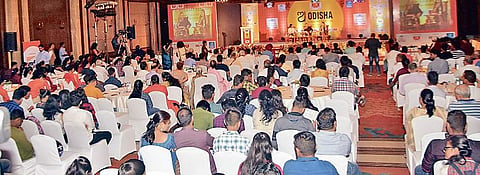

BHUBANESWAR: While popular national sentiment is in favour of abrogation of Article 370 and 35A and the constitutional legitimacy of the process is in question, experts were of the opinion that the narratives on Kashmir are highly fragmented and need of the hour is to build a national consensus on the issue.
Initiating the debate ‘Writing About Kashmir Smoke and Mirrors’ at the 8th edition of the Odisha Literary Festival by The New Indian Express, eminent historian and Associate Professor of Jawaharlal Nehru University Shonaleeka Kaul said more have been invested in politics than the history of the state.
Scholars on Kashmir and journalists speaks only about the last 30 years, may be about 70 years since partisan of Pakistan in 1947.
“I think this is extremely short term and myopic, and the problem is historical identity of regions do not fall into short term. The silence about Kashmir’s historical identity has given rise to two major disinformation - one that Kashmir has a special status and two that it was never part of India. Both of these conventions are not historical and true,” she said.
Kashmir, for 2000 years, has been open as a society, plural and cosmopolitan in nature. It was anciently connected not only to its neighboring Himachal and Punjab but interior culture of India.
Second question to be asked is how the narrative of Kashmir never been a part of India came into being. Negation of Article 370 is perhaps not so much an undoing of Kashmir history but restoring its history in all its openness, plurality and cosmopolitanism.
Dubbing the August 5 incident, when Article 370 was removed, as a momentous decision, Lt General (retd) Ata Hasnain, an expert on Kashmir said there seems to be a perception that the abroagation is the end of resolution of Kashmir problem. Rather, it is just the beginning.
“I am extremely confident that the new beginning will be more beneficial to India. Over the years, the strength of terrorists are reducing which is a ten-fold drop since 2001. The Union Government has taken a new strategy to dismantle the eco-system of terror,” he said.
He said, the eco-system is far beyond terrorists as it arises from the deep state of Pakistan and has extensive networks. No terrorists activities can last without sound financial support. The media in Kashmir has its role in it. Now their narratives have changed, he added.
An author and expert on RSS understanding, Ratan Sharda said Article 370 came in 1949 and 35A was incorporated surreptitiously which took out the rights of the many people. J&K is not just Kashmir.
A majority of the state - Jammu and Ladakh - have been discriminated over the years.
Justifying the action of the Government, Lt General Hasnain said proper justice has been done to people of the newly created regions.
Senior Supreme Court lawyer and author of ‘Unravelling of Kashmir Knot’, Aman Hingorani without naming the Congress said it was not Pakistan but India which conferred disputed territory tag on J&K. New Delhi (read Jawaharlal Nehru) took the Kashmir issue to the UN Security Council.
“We are unable to resolve the Kashmir issue because of the flawed policies pursued from 1947 onwards. More than 50 per cent of the state is under control of Pakistan and China. Till there is disputed tag, nothing is going to solve the Kashmir problem.”
Khalid Shah, of Observer Research Foundation, said the narrative of J&K is highly fragmented. “We talk about mainstream leaders but hardly talk about the common people who are victims of terrorism.
There is no all-encompassing story taking all sides. A fragment of story is taken to suit the political narrative of particular segments.”
Siddhartha Gigoo, author of several books and a Kashmir pandit, narrated how his family was forced to leave the valley by the very people who were their neighbours. He made it amply clear that return to the valley is not possible until there is complete restitution. Consulting Editor, The New Indian Express, Ravi Shankar Etteh moderated the session.